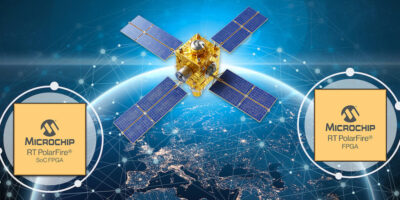Microchip expands space-qualified FPGA portfolio
Continuing to support the evolving needs of space system developers, Microchip has announced two new milestones for its Radiation-Tolerant (RT) PolarFire technology: MIL-STD-883 Class B and QML Class Q qualification of the RT PolarFire RTPF500ZT FPGA and availability of engineering samples for the RT PolarFire System-on-Chip (SoC) FPGA.
MIL-STD-883 Class B and Qualified Manufacturers List (QML) Class Q are industry standards that define rigorous testing and qualification processes for microelectronic components used in high-reliability applications, such as space and defence. MIL-STD-883, developed by the U.S. Department of Defence, outlines methods for environmental, mechanical and electrical testing to ensure device reliability under extreme conditions. QML Class Q, managed by the Defence Logistics Agency (DLA), certifies that manufacturers consistently produce components meeting these stringent requirements.
Unlike traditional SRAM-based FPGAs, RT PolarFire devices utilise nonvolatile technology, making them immune to configuration memory upsets caused by radiation. This eliminates the need for external mitigation measures, helping reduce system complexity and overall cost. RT PolarFire FPGAs consume up to 50% less power than mid-range SRAM-based alternatives, enabling satellite designers to optimise Size, Weight and Power (SWaP) without compromising mission-critical reliability. The PolarFire RTPF500ZT FPGA advances the family’s capabilities, offering enhanced Single Event Latch-up (SEL) radiation performance and increased robustness for inflight programming compared to the original RTPF500T.
This SoC integrates a real-time, Linux-capable, RISC-V-based microprocessor subsystem with a flight-proven FPGA architecture, enabling both flexible software support and deterministic real-time performance. With a roadmap to QML Class V and Class Y, the RT PolarFire SoC FPGA is well suited for central satellite processing, avionics and payload control where high reliability is essential.
RT PolarFire devices are supported by the Libero SoC Design Suite, a comprehensive IP library, reference designs and solution stacks tailored for space applications. RT PolarFire SoC FPGAs also integrate with Microchip’s Mi-V ecosystem for RISC-V development. Additionally, development kits and hardware platforms are available to facilitate rapid prototyping, hardware validation and system integration, enabling engineers to efficiently bring mission-critical space systems from concept to deployment.




